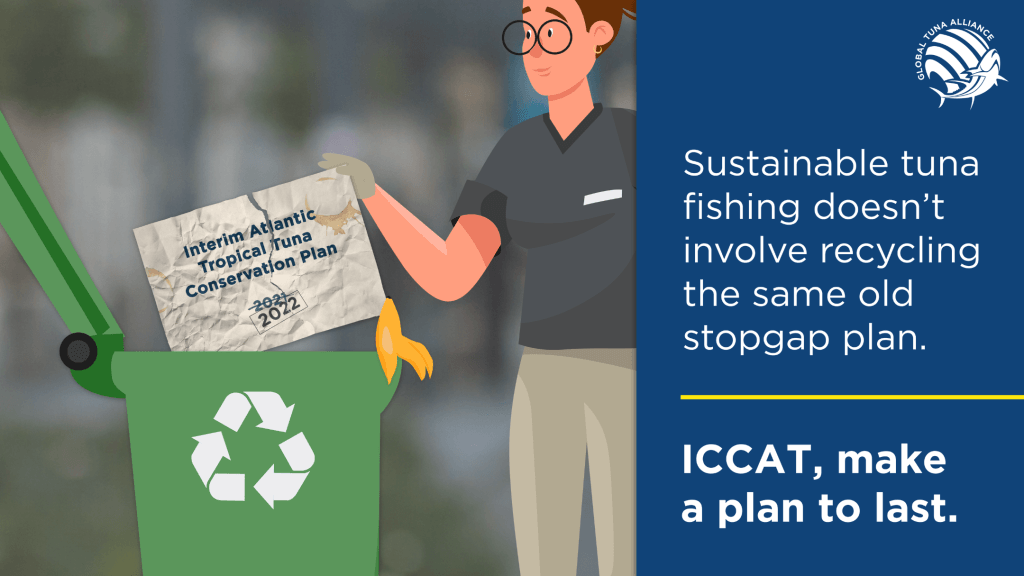
Next week, in the Egyptian capital of Cairo, delegates will gather for the 28th Regular Meeting of the International Commission for the Conservation of Atlantic Tunas (ICCAT). Set across the Nile from where the ancient Pyramids of Giza have stood for millennia, observers will be watching intently to see if these delegates can agree to build their own long-lasting programme for securing the future of tropical tuna stocks in the Atlantic Ocean.
After adopting interim conservation measures in 2021, which were rolled over to 2022, the Global Tuna Alliance (GTA), a pre-competitive collaboration of 50 major seafood suppliers and retailers, are calling on ICCAT to provide the market with the long-term confidence it needs to commit to sourcing from the Atlantic. They want to see an agreement reached on a multi-annual plan to rebuild bigeye tuna stocks within 15 years and maintain yellowfin tuna stocks within the Total Allowable Catch (TAC).
According to the GTA, the current status of the two stocks are precarious. The yellowfin stock has previously been overfished, though the most recent stock assessment in 2019 revealed that this was no longer the case. Meanwhile, the most recent stock assessment published in 2021 for bigeye found that it was overfished and continues to be subject to overfishing.
In 2021, ICCAT implemented a conservation measure intended to keep catch quantities at a sustainable level. However, disputes over the allocation of catches among producing countries meant that the programme was only temporary until the following year. In 2022, a similar failure to agree to allocations meant that the 2021 plan was rolled over for another year.
Albert Arthur, the Global Tuna Alliance’s Director of Outreach and Engagement said:
“ICCAT are, in effect, recycling the same plan over and over again. But it takes a lot of energy to have to meet each year to agree to keep rolling over the same measure. It would take a lot less energy for delegates, and deliver a lot more certainty to tuna purchasers if a multi-annual solution was reached.
“You have to look at it from the market’s perspective. A retailer looking to source sustainably caught tuna is much more likely to want to commit to sourcing from a region that has a 15-year programme in place to protect and rebuild stocks, than a region which cannot guarantee there will be any measure in place this time next year.
“And who loses out if businesses decide it’s not worth the risk? The economies of those producing countries who cannot reach a long-term agreement on catch allocations.”
Specifically, as part of their ask for a multi-annual conservation programme, the GTA are asking ICCAT to adopt a TAC for bigeye that would result in a high probability (>60%) of success within 15 years. They also want a precautionary yellowfin TAC that is aligned with the scientific committee’s advice and which is allocated between fishing gears and countries. But Arthur was keen to emphasise compliance.
“For some, the motivation of securing the future of their livelihoods and local industries through responsible fishing may not be enough to prevent them from going over their allocation. Without mechanisms to identify and sanction non-compliance, any long-term plan would not be effective enough to succeed. We need delegates to be bold and work cooperatively to produce a fair, workable solution.”
As part of its advocacy campaign, the GTA hosted a roundtable discussion on Friday 3rd November, inviting ICCAT delegates to hear directly from representatives of the GTA’s Partners. 22 Partners and delegates attended in total, with delegates coming from the U.S., E.U., Costa Rica, Senegal, Canada, South Africa and Spain. The GTA’s Partners were eager to impress the growing importance of sustainability to their customers and how this impacted their sourcing decisions.
Stacy Schultz, Director of Marketing and Sustainability Coordinator at Fortune Fish & Gourmet said:
“As a Global Tuna Alliance Partner, we are actively engaged in pre-competitive collaboration to promote sustainable tuna fisheries worldwide. Our participation in this Alliance reflects our dedication to positively impacting the environment and the communities that rely on tuna fisheries for their livelihoods.”
“Our customers are at the heart of everything we do. They trust us to provide them with seafood products that are not only delicious but ethically sourced.”
Peter Adame, Director of Communications and Sustainability at Lusamerica Foods, added:
“A lot of our retail and food service customers are demanding more sustainable tuna options. And so I strongly encourage you [ICCAT delegates] at the next session to support harvest strategies, tropical tuna conservation measures and stock assessments that are so pivotal for ensuring proper management of these tuna species.”
The GTA also has a range of other requests aimed at improving the overall environmental performance, social responsibility and transparency and traceability of the Atlantic tuna fishing industry. These relate to minimum standards for electronic monitoring, Port State Measures and the adoption of triannual stock assessments. You can learn more about all of the GTA’s asks in their Position Statement.